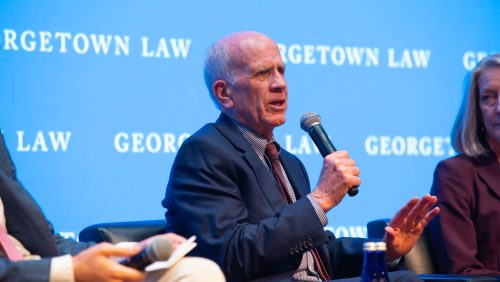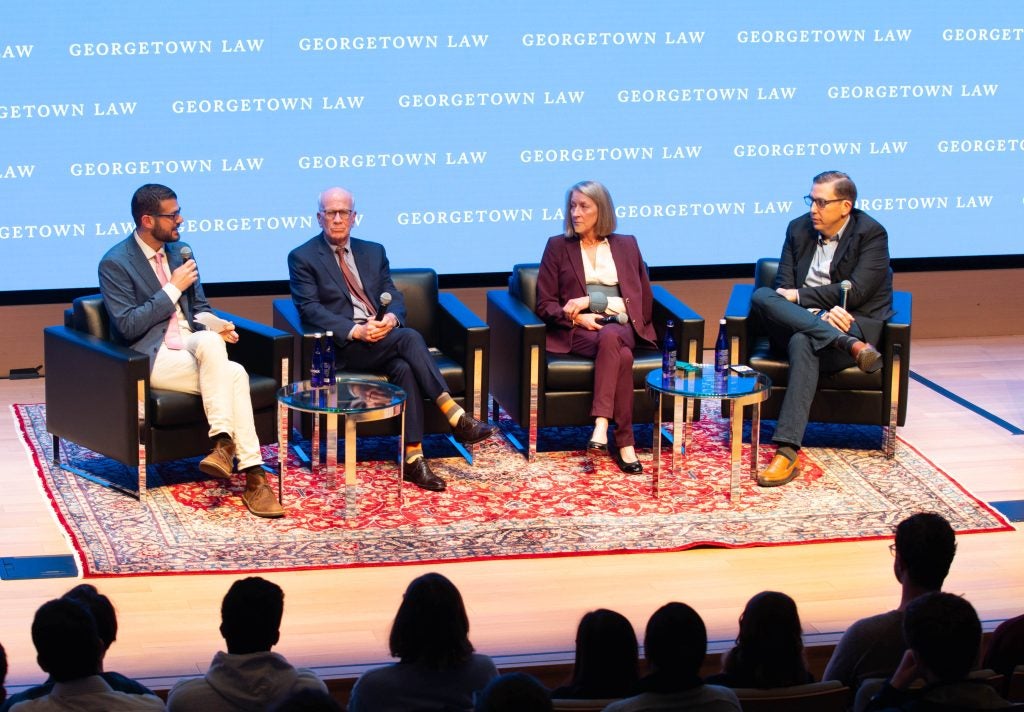The Georgetown Law Journal Hosts Sen. Peter Welch for Discussion on Executive Power and the Rule of Law
April 22, 2025

U.S. Senator Peter Welch (D-Vt.) addressed a student audience in the newly renovated Hart Auditorium.
On April 9, United States Senator Peter Welch (D-Vt.) visited the Georgetown Law campus for a wide-ranging conversation convened by The Georgetown Law Journal about executive power and the role of lawyers, lawmakers and the judiciary in upholding democratic norms and the rule of law.
Welch was joined by Visiting Professor of Law Mary McCord, executive director of the Institute for Constitutional Advocacy and Protection (ICAP), and Agnes Williams Sesquicentennial Professor of Federal Courts Stephen I. Vladeck for the discussion, which was moderated by legal journalist Mark Joseph Stern, C’13, L’16, of Slate.
“We’re in a constitutional crisis,” said Welch in response to a question about separation-of-powers concerns arising under the new presidential administration, citing the administration’s approach to economic policy and the recent deportation of migrants into detention in El Salvador as troubling signs of presidential overreach.
Welch, who serves as ranking member of the U.S. Senate Judiciary Committee’s subcommittee on the Constitution and authored the preface to The Georgetown Law Journal’s forthcoming 54th Annual Review of Criminal Procedure, also underscored the role of Congress and the U.S. Supreme Court in checking the power of the executive branch.
“If norms break down, then the Constitution doesn’t protect us,” he said.
Protecting the government’s credibility

L-R: Mark Joseph Stern, C’13, L’16; Sen. Welch; Profs. Mary McCord and Stephen I. Vladeck.
McCord similarly emphasized what she called a “disturbing” assault on due process in the deportation cases, as well as executive overreach in the administration’s effort to redefine birthright citizenship via executive order and to trample congressional authority by dismantling independent agencies.
“Separation-of-powers work didn’t used to be litigated on a regular basis,” she said in reference to ICAP’s work to safeguard constitutional rights and democratic processes. “Now, we need a ton of lawyers who know about litigating this.”
The trio also discussed the presidential administration’s attempts to exert increased control over the Department of Justice — an approach, they noted, which diminishes the agency’s ability to effectively and impartially enforce federal law.
The agency’s credibility, Vladeck said, is “essential to its ability to obtain criminal convictions, to its ability to pursue civil enforcement actions, to its ability to persuade judges.”
In light of the pressing legal challenges facing advocates and policymakers, the speakers concluded by offering advice to current law students hoping to defend civil liberties in their future legal careers.
“We need young, idealistic, committed, defiant, assertive lawyers more than ever,” said Welch, who before entering Congress worked as a public defender and attorney advocating on matters such as retirement benefits and property rights.
“We don’t have a decision about the times we live in. We don’t have a decision about the circumstances we face,” he said. “We have a decision about whether we’re going to get up and face the day.”